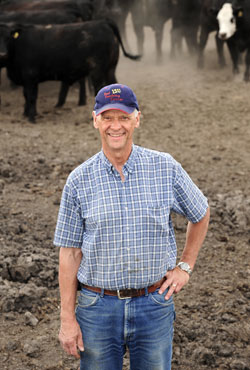Inside Iowa State
Inside ArchivesSubmit newsSend news for Inside to inside@iastate.edu, or call (515) 294-7065. See publication dates, deadlines. About InsideInside Iowa State, a newspaper for faculty and staff, is published by the Office of University Relations. |
July 3, 2008 Farm superintendent feeds off relationships, researchby Dan Kuester, News Service 
Rod Berryman has been a mainstay at Iowa State farms for 31 years. Photo by Bob Elbert. When Rod Berryman took a job at Iowa State's Animal Science Teaching Farm, he figured that he'd found a pretty good job for the short term. After five or six years, he and his wife would move on to somewhere he would like better. To somewhere he and his wife would settle down. To somewhere else. But that's not how it turned out, he now says -- 31 years later. "It's pretty easy to get comfortable here in Ames when you have a job you like and work with good people who you enjoy," Berryman said. Berryman, now the superintendent of the Beef Nutrition Research Farm northwest of Ames on Dakota Avenue, seems genuinely at ease on the farm that he runs along with four other full-time employees and one or two students providing part-time help. The 275-acre farm is the testing ground for cattle nutrition research. When faculty members, researchers or graduate students are working on projects that deal with beef nutrition, they usually seek help from the Beef Nutrition Farm. "Our job is to provide facilities and the animals and to take care of all the day-to-day needs of the animals," Berryman said. "The researchers provide us with all the protocols for the experiments," he said. "Then we purchase the animals, take care of any health issues and get the projects set up according to those protocols." The animals are on the farm for anywhere from 100 to 200 days. The farm tests different kinds of feeds, nutritional supplements or whatever researchers want tested. Right now, the farm is doing a lot of work with distillers grains, the protein-heavy co-product made in the ethanol process. As ethanol's popularity increases, the grains are plentiful and relatively inexpensive. "There are a lot of farmers out there right now asking 'How much of this can we feed? What is the best way to feed it? Does it affect health?' and we try to help the researchers find the answers," Berryman said. Forgettable . . . or notSome of the experiments at the farm have been very helpful. Others, not so much. Several years ago, for example, a private company teamed with Iowa State to see if there was any nutritional benefit to feeding cattle a by-product of heparin production. "They extracted it from intestines of pigs. It was kind of a thick liquid that was nasty looking, green and not nice smelling," Berryman said, grimacing at the memory. "Boy, you wanted to be prepared when you took the lid off." Many of the projects require that staff keep the cattle in separate pens. Some cattle are separated and used as a control group. When there is a need for many experiments, there could be 400 to 500 cattle divided into 60 or more pens. A recent study required Berryman to configure the facility into 32 separate pens. As any cattle farmer can tell you, those cattle can get restless. "I always tell the students I work with that these are domesticated animals, but they are not tame animals," Berryman said. Team buildingBerryman said he enjoys working with students. They've learned lessons together, he noted. "We were weighing some cattle and had a steer that was kind of wild. He got through a fence and headed west," he recalled. "We didn't have any gates closed, because we didn't think we'd have any problems. "We caught up to him about two miles west of here. We thought we could get him contained and loaded on a trailer. That didn't happen. We chased him around for a while and decided we weren't getting anywhere, so we went back to the farm. "By the time we got back, he was here, too. He looked like a racehorse, he was covered with froth. He had run the whole way and beat us back to the farm. "We learned our lesson. Now we tend to close the gates." |
Quote"I always tell the students I work with that these are domesticated animals, but they are not tame animals." Rod Berryman |